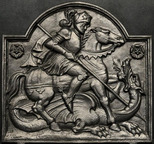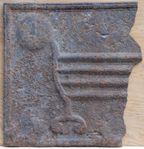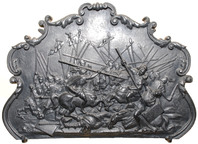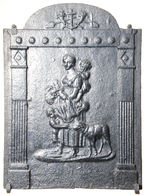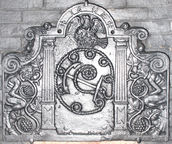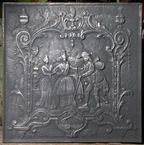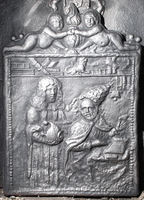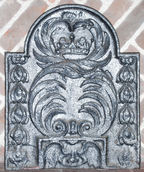-
1211
Description: Arched rectangular shape: ovolo-moulded edging; pictorial scene of St George in armour, mounted on a horse, spearing a dragon which lies beneath the horse; in each top corner, a rose.
Notes: A portrayal of St George and the Dragon in bold relief that owes something to the famous modelling by Benedetto Pistrucci of 1817; however, the figure of St George is disproportionately large in relation to the horse.
- Decoration tags:
- rectangular with round arch (shape)
- ovolo (edging)
- whole carved pattern
- pictorial
- mythological
- animals
- humans
- plants
Manufactured: in the 20th century in England.
Current location: Thornhill Galleries, 43-45 Wellington Crescent, New Malden, London, England.
- Attached to series:
- Miscellaneous pattern firebacks
-
1086
Description: Fragment; rectangular shape; ovolo-moulded edging; image of an iron grate with barred front and integral andiron with iron or brass disc.
Notes: A unique example; it is not certain how the mould was formed, whether by impressing an actual grate or carving a pattern with the image of a grate; the former seems more likely.
- Decoration tags:
- rectangular (shape)
- ovolo (edging)
- simple stamps
- objects
Manufactured: in the mid- to late-17th century possibly in the Weald area of England.
Current location: in private hands, Outwood, Surrey, England.
- Attached to series:
- Miscellaneous pattern firebacks
- Metalware stamp firebacks
-
560
Description: Quasi-arched rectangular shape with symmetrical double fillet rococo edging; high relief pictorial battle scene with mounted knights carrying lances and pennants.
Notes: The battle scene may have been inspired by more than one classical portayal of a battle in history; likely sources are 'The Defeat of the Pisans at the Tower of St Vicenzo' by Giorgio Vasari and 'Alexander the Great's crossing of the Granicus' by Charles Le Brun. An engraving by Daniel Kellerthaler (1574-1648) has a similar frame enclosing an unidentified cavalry conflict. Mitford collection, Petworth House. Copies of this fireback were advertised in Burton Weir's (Rotherham) catalogue in the early-20th century.
Copies of this fireback are known.
- Decoration tags:
- baroque (shape)
- complex individual (edging)
- whole carved pattern
- pictorial
- humans
Manufactured: in the late-18th to early-19th century in England.
Current location: Petworth House, Petworth, West Sussex, England.
Museum number: NT/PET/M/54 (part of the National Trust museum group)
- Attached to series:
- Miscellaneous pattern firebacks
-
582
Description: Arched shape with ovolo-moulded edging; figure of a classical warrior with plumed helmet and shield, holding a sword in his right hand; inscription to left of head, probably continued to right by now no longer visible.
Notes: An unusually striking fireback of simple design. Mitford collection, Petworth House.
Inscription: ANNO ...
- Decoration tags:
- rounded arched (shape)
- ovolo (edging)
- whole carved pattern
- pictorial
- mythological
- text
- humans
Manufactured: in the mid- to late-17th century possibly in the Lorraine area of Germany.
Current location: Petworth House, Petworth, West Sussex, England.
Museum number: NT/PET/M/73 (part of the National Trust museum group)
- Attached to series:
- Miscellaneous pattern firebacks
- 'Dutch' Miscellaneous Firebacks
-
533
Description: Arched rectangular shape; fluted pilasters supporting a lintel with nine evenly spaced flowers arranged horizontally; central standing female figure, holding a basket of flowers, a child upon her back, another child by her side, and a sheep to her left; on top, a symmetrical arrangement of an anchor, two paddles and two cornucopiae.
Notes: The figure would seem to represent Charity. One of a series with a distinctly Empire style. Mitford collection, Petworth House.
- Decoration tags:
- rectangular with round arch (shape)
- none (edging)
- whole carved pattern
- pictorial
- allegorical
- animals
- humans
Manufactured: in the late-18th to early-19th century in France.
Current location: Petworth House, Petworth, West Sussex, England.
Museum number: NT/PET/M/86 (part of the National Trust museum group)
Citation: Carpentier, H., 1912, Plaques de Cheminées (Paris, published by the author).
- Attached to series:
- Miscellaneous pattern firebacks
-
585
Description: Central arched rectangular shape formed of fluted Ionic pilasters supporting a rounded arch, with fillet edging, bearing the date between two flower heads; beneath is a fouled anchor within a circlet of rope gathered into eight loops; a phoenix, its wings displayed and inverted, rises from the flames above the rope; mirrored outside each pilaster, a crouching, naked faun, facing inwards, disgorges a vine with bunches of grapes; above each faun a volute forms the top corner of the plate.
Notes: The decorative elements of this fireback have yet to be fully interpreted; the vines disgorged from the mouths of the fauns are related to the 'green man' tradition associated with woodland spirits and symbolising resurrection, the latter echoed by the phoenix, though in the form in which they appear on this fireback they may be a purely decorative device. By contrast, the cabled anchor is the badge of the Lord High Admiral who, in 1608, was Charles Howard, 1st Earl of Nottingham (previously Lord Howard of Effingham). A pastiche of this fireback, dated 1633, is also known (no. 1064).
Copies of this fireback are known.
Inscription: 1608
- Decoration tags:
- rectangular with canted top corners and round arch (shape)
- fillet (edging)
- whole carved pattern
- pictorial
- mythological
- text
- humans
- plants
- objects
Manufactured: in 1608 in the Weald area of England.
Current location: Petworth House, Petworth, West Sussex, England.
Museum number: NT/L/PET/M/117.1 (part of the National Trust museum group)
Citation: Lloyd, N., 1925, 'Domestic Ironwork I', Architectural Review, 58, pp. 58-67.
- Attached to series:
- Miscellaneous pattern firebacks
- Phoenix firebacks
-
605
Description: Rectangular with ovolo-moulded edging; elaborate symmetrical rococo design framing a pictorial representation of an old man and two young women.
Notes: Carpentier (p.116) ascribes this design to Fontaine's fable of Les Oies de frere Philippe - Brother Philip's Geese.
- Decoration tags:
- rectangular (shape)
- ovolo (edging)
- whole carved pattern
- planklines
- pictorial
- allegorical
- humans
Manufactured: in the 18th century in France.
Current location: Mark Ripley Forge & Fireplaces, Northbridge Street, Robertsbridge, East Sussex, England.
Citation: Carpentier, H., 1912, Plaques de Cheminées (Paris, published by the author).
- Attached to series:
- Miscellaneous pattern firebacks
-
609
Description: Rectangular with plait-effect border and a column of beads down each side; pictorial scene of a male figure in gown and full-bottom wig, holding a fool’s cap in his right hand, standing behind a seated male figure, bald and bearded, with the papal triple crown falling off his head; he is seated at a desk on which are two books; behind him and to the right, three books are on a small shelf. Above the figures, a longer shelf, the width of the plate, supports other books and papers, together with the figure of a dog, from whose mouth a scroll issues bearing an unreadable inscription. On top, two putti hold hands in front of a flaming grenade.
Notes: The design is copied from a cartoon of c.1672 showing Titus Oates, the instigator of the popish Plot, presenting a fool’s cap to the Pope (see Hodgkinson 2010, p.209).
Copies of this fireback are known.
- Decoration tags:
- rectangular with ornate arch (shape)
- bead (edging)
- whole carved pattern
- pictorial
- humans
- objects
Manufactured: in the late-17th century in England.
Current location: Mark Ripley Forge & Fireplaces, Northbridge Street, Robertsbridge, East Sussex, England.
- Attached to series:
- Miscellaneous pattern firebacks
-
629
Description: Arched rectangular shape with cavetto canted shoulders; wide fillet edging with cavetto moulding inside; within a baroque frame, the seated figure of an old man clasping his cloak, a smoking urn to his left.
Notes: Probably the allegorical figure of Winter.
- Decoration tags:
- rectangular with canted top corners and round arch (shape)
- fillet and cavetto (edging)
- whole carved pattern
- pictorial
- allegorical
- humans
- objects
Manufactured: in the 18th century in France.
Current location: Mark Ripley Forge & Fireplaces, Northbridge Street, Robertsbridge, East Sussex, England.
- Attached to series:
- Miscellaneous pattern firebacks
-
646
Description: Arched rectangular shape; fillet edging; bell-flower column repeated on each side; at bottom, central rectangular panel, fillet edged, enclosing outstretched wings; above, intertwined leaves in figure-of-eight, enclosing a crown at the top.
Notes: This fireback incorporates features of the ‘Dutch’ style but within an English form.
- Decoration tags:
- rectangular with round arch (shape)
- fillet (edging)
- whole carved pattern
- heraldic
- plants
Manufactured: in the mid- to late-17th century in England.
Current location: Eastgate House, High Street, Rochester, Kent, England.
Museum number: A3484 (part of the Rochester Guildhall Museum museum group)
- Attached to series:
- Miscellaneous pattern firebacks
